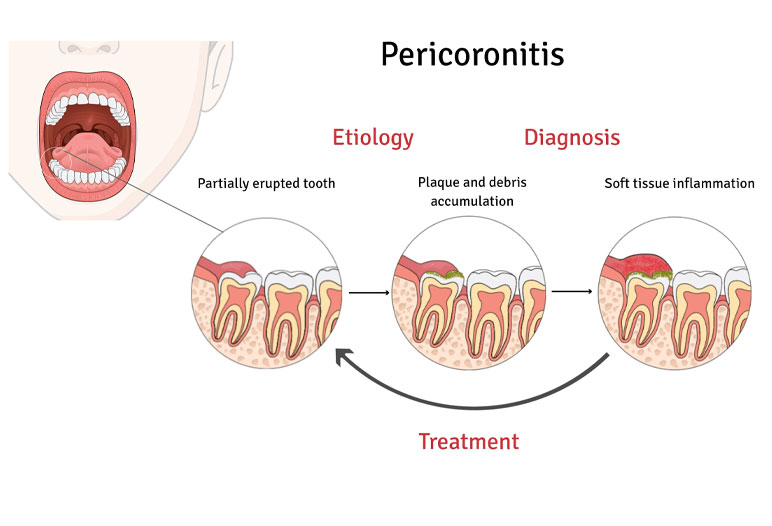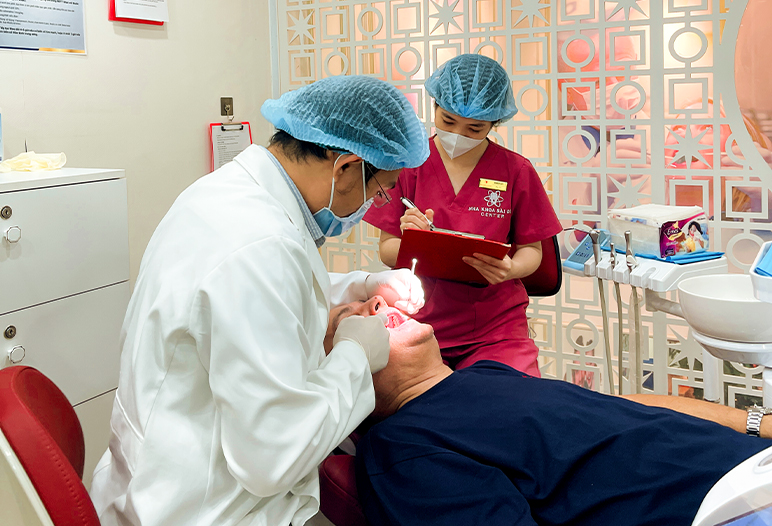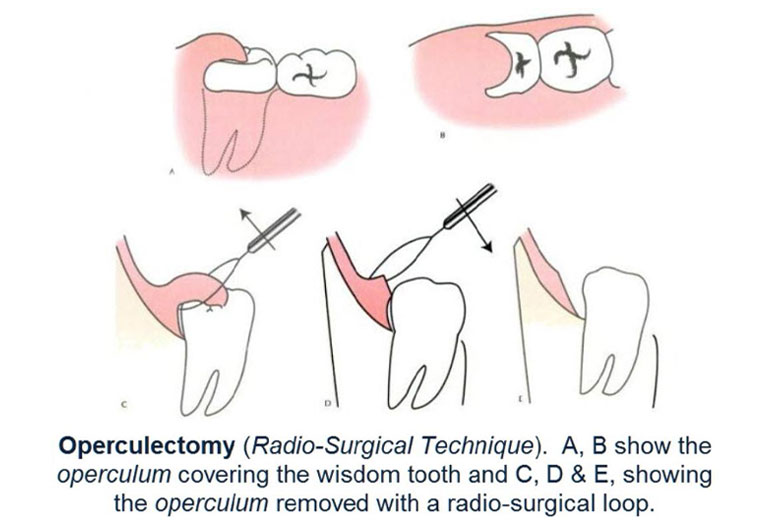Pericoronitis is a dental condition characterized by inflammation of the gum tissue surrounding a partially erupted tooth, most commonly a wisdom tooth. This painful condition can lead to significant discomfort and complications if not addressed promptly. Understanding pericoronitis is crucial for anyone who may be experiencing symptoms or seeking effective treatment options.
What is Pericoronitis?
Pericoronitis refers to the inflammatory condition that occurs when the gum tissue around a partially erupted tooth becomes swollen and painful. It primarily affects wisdom teeth, which are the last molars to emerge in the back of the mouth. When these teeth do not fully erupt, they can create a flap of gum tissue, known as the operculum, that accommodates food particles and bacteria, leading to infection and inflammation.
The causes of pericoronitis often include:
- Partially Erupted Tooth: As a wisdom tooth emerges, it may only partially break through the gums. This situation creates a pocket where bacteria and food debris can accumulate.
- Food Impaction: Particles of food can become trapped under the operculum, further aggravating the inflammation and leading to an infection.
- Poor Oral Hygiene: Insufficient brushing and flossing habits can promote the growth of harmful bacteria in the mouth, increasing the risk of pericoronitis.
The discomfort associated with pericoronitis can range from mild irritation to severe pain. Many individuals describe a throbbing ache in the area surrounding the affected tooth, which can make eating, drinking, and even speaking very difficult.
Potential complications of untreated pericoronitis include infections that can spread to other areas of the jaw, the development of abscesses, and even difficulties in opening the mouth – a condition known as trismus.
Symptoms of Pericoronitis
Recognizing the signs of pericoronitis early on can prevent severe complications and help in seeking timely treatment. The typical symptoms include:
Common Symptoms
- Swelling and Redness: Patients frequently notice swelling and redness around the wisdom tooth, especially when looking in the mirror.
- Severe Pain: One of the hallmark symptoms is intense pain, particularly while chewing or attempting to open the mouth.
- Bad Breath: An unpleasant taste and bad breath often accompany this condition due to the presence of bacteria.
- Difficulty Swallowing: Inflammation may lead to problems with swallowing, causing further distress.
- Fever: Sometimes, a fever may occur if an infection develops in conjunction with pericoronitis.
- Swollen Lymph Nodes: In some cases, lymph nodes in the neck may swell, indicating that the body is fighting an infection.
Pericoronitis Pain Unbearable
Many people suffering from pericoronitis describe the pain as unbearable. This intensity can significantly affect daily life, from preventing proper nutrition to interfering with social interactions.
The throbbing, sharp pain often radiates to nearby areas, making it challenging to focus on work, school, or other essential activities. Those experiencing this level of pain should prioritize seeking professional help. Ignoring the symptoms could lead to more severe issues, including chronic pain or persistent oral infections.
The psychological impact of enduring such pain cannot be overstated. Many individuals find themselves feeling anxious or overwhelmed, unsure of how to alleviate their discomfort. Seeking immediate medical attention can provide much-needed relief and enable patients to regain their quality of life.

Prevention of Pericoronitis
Preventing pericoronitis is largely achievable through good oral hygiene practices and regular dental checkups. Here are some ways to reduce the risk of developing this condition:
Good Oral Hygiene
Maintaining excellent oral hygiene is paramount in preventing pericoronitis.
Regular brushing and flossing help eliminate food particles and plaque buildup that contribute to gum inflammation.
It is advisable to use a soft-bristled toothbrush, which is gentler on the gums and reduces the risk of exacerbating any existing inflammation. Interdental cleaners, like dental floss and brushes, can effectively remove debris from hard-to-reach areas, specifically between the molars.
A consistent oral hygiene routine can minimize the chances of developing pericoronitis and promote overall dental health.
Dietary Considerations
Diet plays a significant role in oral health. Avoiding hard or sticky foods that can easily become trapped around the wisdom teeth will significantly help.
Such foods can worsen the condition if they get lodged under the operculum, irritating the inflamed gum tissue and promoting bacterial growth.
Opting for softer foods that are less likely to stick between teeth will ease the discomfort and lessen the chance of developing inflammation around the wisdom teeth.
Regular Dental Checkups
Frequent dental checkups are integral to maintaining oral health and preventing conditions like pericoronitis. Consulting a dentist in Ho Chi Minh City for regular examinations allows for early detection and intervention.
During these visits, dental professionals can assess the status of the wisdom teeth and take necessary steps to prevent complications. They may offer advice on improving oral hygiene practices or recommend preventive treatments that can mitigate the risk of developing pericoronitis.

Pericoronitis Treatment in Ho Chi Minh City
When dealing with pericoronitis, seeking professional treatment is critical, especially when home remedies do not alleviate the pain. Here are some common professional treatment options available in Ho Chi Minh City:
Professional Treatment Options
Patients suffering from pericoronitis should consult dental professionals for effective treatment options available in Ho Chi Minh City. Dental clinics offer various treatments tailored to the severity of the condition.
Oral antibiotics may be prescribed to treat any underlying infections caused by bacteria. Discussing the specifics of antibiotic use with a healthcare provider can ensure the right medication is chosen for individual needs.
Another common treatment method is irrigation, which involves flushing out food debris and bacteria from the affected area. This procedure can provide immediate relief from pain and inflammation.
For severe cases of pericoronitis, an operculectomy may be performed. This surgical procedure removes the inflamed gum flap (operculum), providing better access to the affected tooth and alleviating symptoms.
In some instances, wisdom tooth extraction may be recommended as a permanent solution. While this decision can have pros and cons, removing the problematic tooth may ultimately prevent future occurrences of pericoronitis.
Oral Antibiotics
Oral antibiotics play a vital role in treating infections associated with pericoronitis. These medications work by targeting the specific bacteria responsible for the inflammation.
Commonly prescribed antibiotics include penicillin and metronidazole, which effectively combat the bacterial overgrowth contributing to the condition.
It is essential for patients to follow the prescribed course of medication, even if symptoms improve before completion. Failing to do so can result in recurrent infections and potential resistance to the antibiotic.
Irrigation
Irrigation is a valuable treatment technique for cleansing the affected area of pericoronitis. During this procedure, a dentist uses a specialized syringe to flush out food particles and bacteria that may be trapped under the operculum.
This process helps reduce inflammation and provides immediate relief from pain.
After irrigation, dentists often provide additional care instructions to maintain optimal oral hygiene and prevent reinfection.
Operculectomy
Operculectomy is a minor surgical procedure performed to remove the inflamed operculum tissue around the affected wisdom tooth. This procedure is beneficial because it eliminates the area where food debris and bacteria can accumulate, thus reducing the likelihood of recurrence.
Though it may sound daunting, operculectomy is typically performed under local anesthesia and has a quick recovery time.
Patients usually report significant relief from pain shortly after the procedure, allowing them to return to their regular activities with ease.

Wisdom Tooth Extraction
In more severe cases of pericoronitis, dentists might recommend wisdom tooth extraction as a long-term solution. While this option requires careful consideration, it can resolve recurrent issues related to painful wisdom teeth.
The decision to extract a wisdom tooth depends on several factors, including the tooth’s position, the extent of inflammation, and the potential for future complications.
Patients should discuss the pros and cons of extraction with their dentist and consider their overall dental health before making a decision.
Conclusion
In conclusion, pericoronitis is a painful and potentially serious dental condition that arises from the inflammation of the gum tissue around partially erupted wisdom teeth. Recognizing its symptoms and understanding the importance of prevention and treatment can significantly impact one’s oral health and well-being.
From maintaining proper oral hygiene to seeking professional help when needed, there are numerous strategies to manage and prevent pericoronitis. If you find yourself facing unbearable pain from this condition, remember that help is readily available from dental professionals in Ho Chi Minh City. Taking action can lead to relief and a healthier smile.



SAIGON CENTER DENTAL CLINIC
Best dentist in Vietnam
Saigon Center Dental Clinic is proud to be one of the most prestigious dental clinics in Ho Chi Minh City with a variety of services: Single dental implant, Full jaw dental implant (especially All On 4, All on 6, and Zygoma Implant), Cosmetic porcelain crowns, Porcelain veneers, Braces, Clear braces, Tooth fillings, Wisdom tooth extraction, Treatment of toothache...
SAIGON DENTAL IMPLANTS CENTER
Best dentist in Vietnam
Saigon Implant Center - Dental Clinic utilizes the latest technology for specialized treatment in the field of Single implant, full jaw implants, All on 4 implants, All on 6 implants, Zygoma implant....